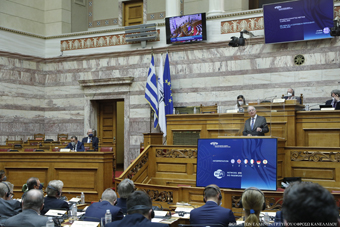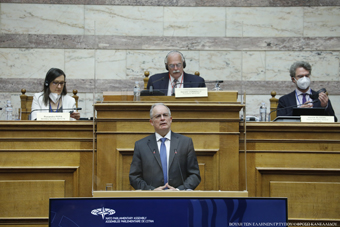Press Office
Athens, 10 April 2022
Hellenic Parliament President addresses Spring Meeting of NATO PA Standing Committee
 The meeting of the NATO PA Standing Committee, which is hosted at the Hellenic Parliament, kicked off with an address by the President of the Hellenic Parliament Constantine Tassoulas.
The meeting of the NATO PA Standing Committee, which is hosted at the Hellenic Parliament, kicked off with an address by the President of the Hellenic Parliament Constantine Tassoulas.
The President of the Parliament highlighted the following in his address:
"It is a great pleasure and honour, as President of the Hellenic Parliament, to welcome, at the heart of Greek parliamentarism, at the heart of Greek democracy in the Plenary of the Greek national delegation, the distinguished President of the NATO Parliamentary Assembly, US Congressman for the state of Virginia Gerald Connolly and all of you for the spring meeting of the NATO PA Standing Committee. It is indeed moving and only fair that we launched the meeting by paying tribute to a distinguished colleague of ours, distinguished both in the local political system and in the international one. Her career began as an MEP in 1984 and concluded with her holding the position of Vice-President of the NATO PA. These two posts in the beginning and end of her political life – at the European Parliament and NATO – symbolise not only her own commitment, but also the commitment of her country, the commitment of our country to the fundamental European values, on which we built our post-war story and our post-war prosperity and prospects. And Mrs Marietta Giannakou’s successful career, which we paid tribute to earlier with a moment of silence, flowers and thoughts, her career leaves us with a message to continue this effort, to improve Euro-Atlantic institutions, to improve the EU and bring it even closer to its people and to make NATO even more effective in its mission.
Mr President, you represent the US, the state of Virginia, which faces the Atlantic and at the Universities of which there are great departments for classical studies. Yesterday you visited the heart of the classical message to humanity, the Acropolis museum and I am certain and I heard you say it, that you were impressed by the classical art of ancient Athens. NATO, these days in light of the Madrid Summit, is adjusting its strategy from the Lisbon Summit Declaration 12 years ago, to the decision that will be taken in Madrid on the new strategic concept based on the "360-degree approach", based on the “NATO 2030 Agenda”. I wish to insist on the classical values of NATO, the roots of NATO, which should, in any case, continue to guide us in the current world and through current decisions.
A distinguished colleague of yours Mr President, who represented Michigan, Arthur Vandenberg, was one of NATO’s architects, and the “Vandenberg resolution” in 1948 led in the spring of 1959 to the establishment of NATO. This significant personality, this parliamentarian, delivered a classic speech in the US Senate on 10 January 1945. And that speech led to the establishment of NATO. Greece was in that speech. Arthur Vandenberg said the following at the US Senate on 10 January 1945, months before Japan’s surrender: “When Mr Churchill spoke in the British Parliament last December 15, defending his own current course in Greece … he said: There is no doubt that when the time comes the United States will make its own pronouncement upon these matters … to prevent outbreak of future war”. In the same speech he explained that: “There are two ways to do it. One way is by exclusive individual action in which each of us tries to look out for himself. The other way is by joint action in which we undertake to look out for each other.” He called the old way the “fraternity of war” and the new way the “fraternity of peace”. And he went on to say: “But I do not believe that any nation hereafter can immunise itself by its own exclusive action. … We must win these wars with maximum speed and minimum loss. Therefore we must have maximum Allied cooperation and minimum Allied frictions.”
And on this basis, from this speech, the North-Atlantic Treaty was later created, which was signed in the US a month before the end of the Berlin blockade and which demonstrated the determination of the free world to maintain its independence and to protect itself by securing democracy and freedom.
Yesterday you saw the Acropolis. At the Acropolis, 2,500 years ago, Vandenberg’s speech on individual and collective defence, was uttered for the first time by the Athenian youth, turning 18 and as an adult becoming a citizen and a soldier. What did the Athenian youth’s oath, the ephebic oath, say, when they received a shield and a spear for the very first time: “I will never bring reproach upon my hallowed arms, nor will I desert the comrade at whose side I stand, but I will defend our altars and our hearths, single-handed or supported by many”. Single-handed was the previous example. Supported by many is the new form of NATO. And while we look for nice words to describe NATO’s modern course, “strategic orientation”, “2030 Agenda”, “360-degree approach”, the classic concepts are ultimately safer and more expressive than our newer formulations. And on this expressiveness of the older formulations, I will mention that on 18 February 1952, in this very hall, the Hellenic Parliament, by an overwhelming majority, ratified Greece’s accession to NATO and a distinguished conservative politician of that time, Konstantinos Tsaldaris, who had served as Prime Minister in difficult previous times, characterised the North-Atlantic Treaty as “the tombstone of the idea of any future war”.
Ladies and gentlemen colleagues, my country has always been loyal to the Atlantic Alliance and mainly loyal to collective security and has always had high expectations of NATO. When humanity was holding its breath, at the end of October 1962, due to the Cuban Missile Crisis, the Soviet Ambassador in Athens Nikolai Korukine visited the Greek Foreign Minister Evangelos Averof and said to him the following, which I am taking from an aged file of the Foreign Ministry: “The Greek government welcomes the US blockade. If so, then Greece is assuming great responsibility, because it is understandable that the US’s current activity can lead to disaster. You seem to be supporting the US’s pirate activities. Greece must consider its responsibilities, because if the Soviet Union imitated the Americans, we should have imposed a blockade against Greece, since you also are hosting weapons targeting the Warsaw Pact and if this continues we will have war.” What did the Greek Foreign Minister respond to the Soviet threat during the most difficult moment of the Cold War: “The accusations against the US ignore the fact that the US by taking the measures that it did aimed to prevent an attack. But regardless of all this, Ambassador, Greece’s position is that of a loyal member of NATO and we are not afraid of war”. I gave you this example to show you how loyal Greece has always been to NATO. And to remind you of Vandenberg’s words that in NATO we should have maximum cooperation and minimum friction and that we should abide by that. So it is today that my country participates in the sanctions against Russia. President Zelenskyy addressed the Hellenic Parliament three days ago via teleconference and he told us about the suffering in his country due to the barbaric Russian invasion. And know that you are in a country that has always supported, at a cost, its presence in NATO and now participates in it and expressed fruitful views on its strategic transformation, which should take into account not only threats to security, but also the modern-day problems of the climate crisis and the migrant crisis.
So I welcome you to the Hellenic Parliament. I welcome you to Greece, the classical values of which still run through the classical texts of NATO and the classical values of which, of freedom and democracy, are the only reason we must continue to provide security, not just to our members, but to the entire world, if we wish it to be democratic and prosperous."
Watch the speech here (available in Greek).
High resolution images
Related files
Back